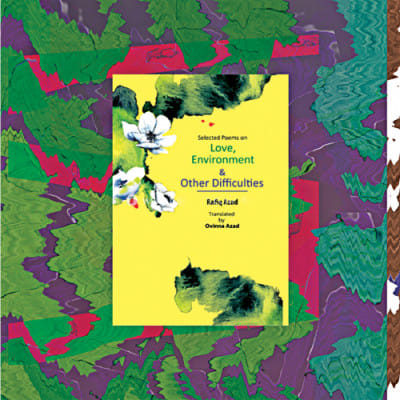A son’s tribute to Rafiq Azad’s poetry

Selected Poems on Love, Environment & Other Difficulties (Chitra Prokashani, 2020) is a collection of poems by the late Rafiq Azad, one of the most prolific poets of Bangladeshi literature, translated from Bangla by his son Ovinna Azad. Rafiq Azad was the mastermind of the short lived "Sad Generation" movement (1964-65) which, led by writers such as Belal Chowdhury, Abdul Mannan Syed, Prasanta Ghoshal and many others, had its roots in nihilism, existentialist sadness, and a sense of non-conformity towards conventional morality, largely inspired from the Beat Generation movement in the USA. The Sad Generation poets showed a lack of interest in politics and newspapers, which seemed to stem from the censorship imposed by the military rulers of that time, General Ayub Khan in particular.
After Bangladesh's independence, Rafiq Azad returned to the literary arena as a transformed poet, devoted to his social and political responsibilities. His inspiration ranged across love, closeness to nature, search for familial roots, the commonalities of urban life, and the contingencies of contemporary society and politics.
The poems in this book reflect the ecocriticism that Azad was among the first to introduce in his works. Most of these poems were written in the 1990s, and were years ahead of their time in subject matter and the concerned tone he adapted. By humanising different elements of nature and instilling a sense of empathy among readers, these poems lend a gentle voice to the growing global discourse on environmental and climate issues, the most urgent problem concerning the world today.
One such poem is "The Axes in Your Hands", in which Azad expresses his agony over deforestation. Written in a strong, arresting tone and language, the humanisation of forestry and nature here make the reader feel unified with these elements; the pains of the forests are felt by the reader as their own. In translation, verses like, "Human, is hostility your favourite habit?" remind the reader how powerful a medium poetry can be even in delivering messages generally confined to the territory of non-fiction.
Another poem that captivates is "Beautiful Barbarians". It talks about the modern world as it has existed over the last hundreds of years—capitalist and unjust. Azad hopes for a revolution through which the youth can take the world toward better days, when equality and justice cease to be utopian ideals and tip over this side of reality.
Ovinna Azad does well to preserve the poems' spirit and imagery in translation. In "I Leave Behind", the poet talks about lost, but not forgotten, memories and glimpses of the past, using motifs of sounds and images. He writes:
"Sweet treats made by Bostumis, sparkling clean households,
And their sweet banter: "Ogo- Hai go" a laughter of kind-
I leave behind."
When I read this collection, I found more than the translation of poetry. Both the author and translator, father and son, seem to share a bond beyond blood. Both, as mentioned in the jacket, are avid readers and nocturnal creatures. In addition to the technicalities of language and form, when I read these translated poems, I found a son trying to preserve and find solace in his father's legacy. This collection is special because it is personal and heart-warming.
Nahaly Nafisa Khan is sub-editor of Toggle, The Daily Star and a contributor of Daily Star Books.

 For all latest news, follow The Daily Star's Google News channel.
For all latest news, follow The Daily Star's Google News channel. 



Comments